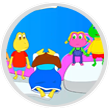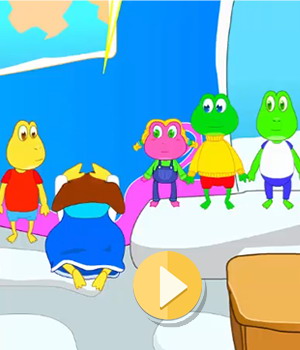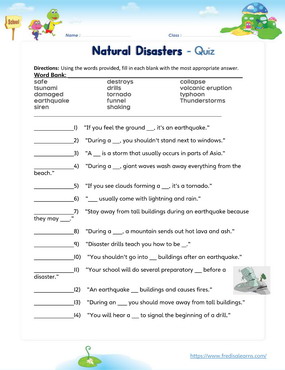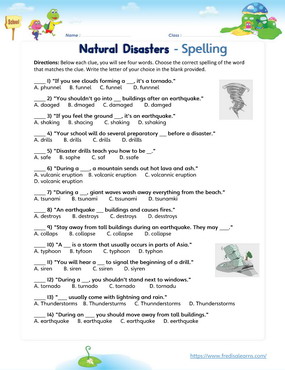Unit 6: Natural Disasters
Objectives:
- This lesson teaches English learners vocabulary about natural disasters.
- The lesson teaches ESL kids how to talk about disaster safety before, during and after.
- Its grammatical objective is to reinforce the use of the modal verb ‘should’ for giving advice.
- The lesson also teaches the use of ‘if clause’ and ‘main clause’ in zero conditional sentences. Zero conditionals are commonly used to talk about established facts or truths.
- This English lesson also reviews the use of the conjunction ‘because’, which is used when giving reasons.
Main Lesson Materials & Study Steps
1st –This cartoon animated video features a short dialogue, followed by vocabulary and sentence breakdown. It is essential for introducing the words, phrases, grammar, spelling and sentences of the lesson in context. Watch repeatedly to master the content. The video plays on any device.
2nd – Then the student plays this fun game after watching the video, to practice the contents of the lesson. The game reviews key vocabulary, grammar and sentences from the lessons. This game can be played on any device.
3rd – Finally the learner takes this test of the unit. The score of this test is captured in the LMS and gives educators an idea of how well their learner is doing. The test opens on any device – mobile & PC.
Worksheets for the Unit
The worksheets below are useful for offline and classroom activities. These printable exercises directly correlate with the above lesson 'Natural Disasters'. Every worksheet comes with an answer sheet on the second page for educators.
Already a Member?
Not a member yet?
Lesson Story:
Today at school, the teacher is leading a disaster drill to help students learn how to be safe during a tornado. Ms. Ann explores possible scenarios during a tornado and recommended actions for staying safe. The students also want to know why these actions are important. Ms. Ann does the good job of explaining the reasons to the students.
Vocabulary:
Natural disasters
| tornado |
| earthquake |
| lightning |
| thunderstorms |
| volcanic eruption |
| tsunami |
| typhoon |
Other Words
| drill |
| siren |
| get ready |
| outside |
| indoors |
| funnel |
| cloud |
| sound |
| wall |
| spin |
| safe |
| destroy |
| winds |
Sentences
Disaster Advice – Using modals ‘should/shouldn’t’
- You should stay indoors during a tornado.
- You should get to the corner of room.
- You shouldn’t go outside during a tornado.
- You shouldn’t stand near windows during a tornado.
Earthquake Advice: Before, During & After
- Before an earthquake, you should do preparatory drills.
- During an earthquake, you should move away from tall buildings.
- After an earthquake, you shouldn’t go into damaged buildings.
If clause + main clause in conditional sentences
- If there is a tornado, you should hide under a table.
- If you see clouds forming a funnel, it’s a tornado.
- If you feel the ground shaking, it’s an earthquake.
Giving reasons - because
- Why should we put our heads down on our knees?
- Because if something flies by, it wouldn’t hit your head.
- Why should we protect our heads?
- Because your head is the most important part of your body.
Extended Vocabulary - Word Association
| tornado | funnel cloud |
| earthquake | shake/tremors |
| volcanic eruption | lava flow |
| tsunami | big wave |
| typhoon | strong winds |
This lesson is part of the Level 7 English course.














